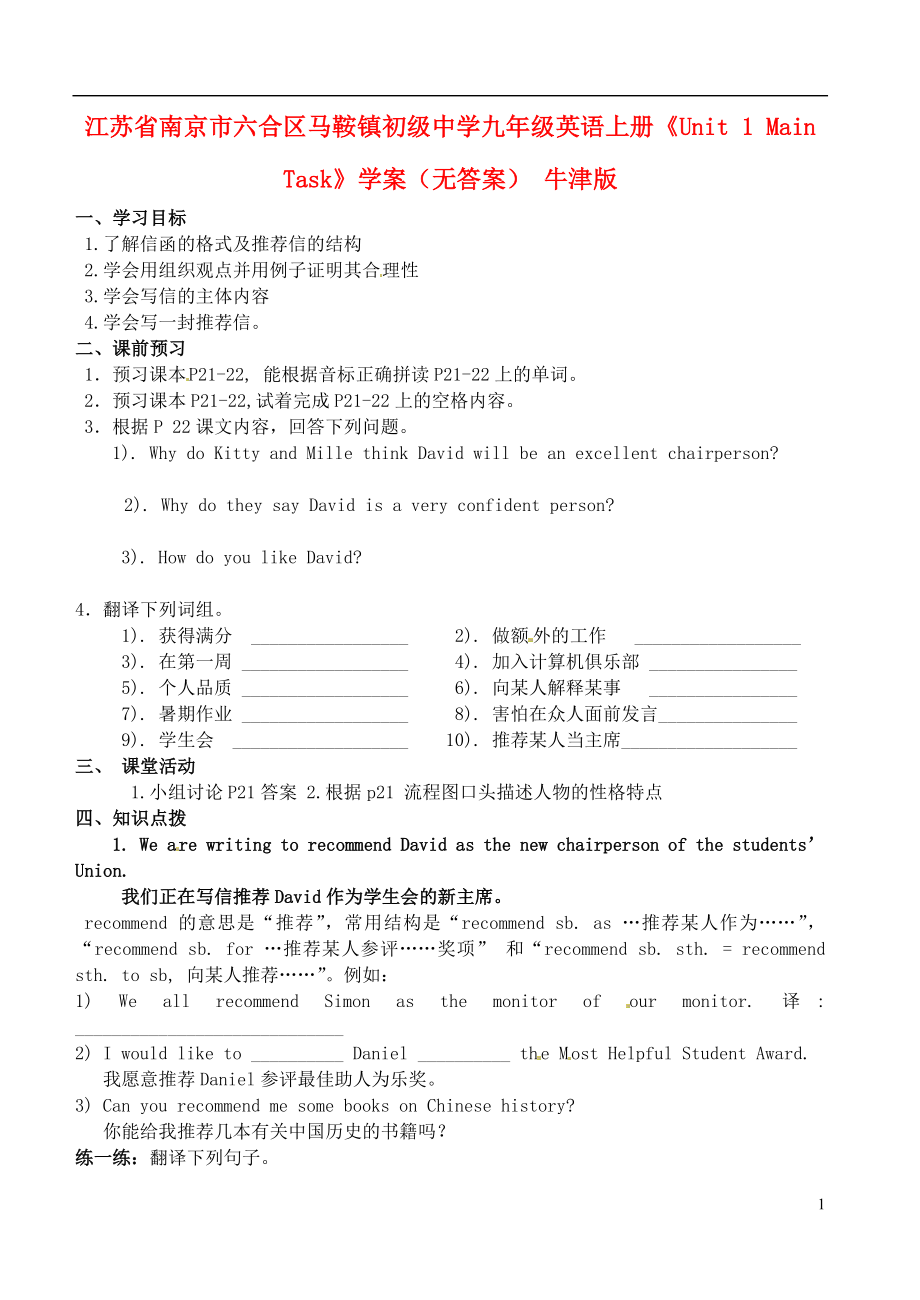《江蘇省南京市六合區(qū)馬鞍鎮(zhèn)初級(jí)中學(xué)九年級(jí)英語(yǔ)上冊(cè)《Unit 1 Main Task》學(xué)案(無(wú)答案) 牛津版》由會(huì)員分享�,可在線閱讀�,更多相關(guān)《江蘇省南京市六合區(qū)馬鞍鎮(zhèn)初級(jí)中學(xué)九年級(jí)英語(yǔ)上冊(cè)《Unit 1 Main Task》學(xué)案(無(wú)答案) 牛津版(2頁(yè)珍藏版)》請(qǐng)?jiān)谘b配圖網(wǎng)上搜索。
1����、
江蘇省南京市六合區(qū)馬鞍鎮(zhèn)初級(jí)中學(xué)九年級(jí)英語(yǔ)上冊(cè)《Unit 1 Main Task》學(xué)案(無(wú)答案) 牛津版
一����、學(xué)習(xí)目標(biāo)
1.了解信函的格式及推薦信的結(jié)構(gòu)
2.學(xué)會(huì)用組織觀點(diǎn)并用例子證明其合理性
3.學(xué)會(huì)寫信的主體內(nèi)容
4.學(xué)會(huì)寫一封推薦信�����。
二�、課前預(yù)習(xí)
1.預(yù)習(xí)課本P21-22, 能根據(jù)音標(biāo)正確拼讀P21-22上的單詞。
2.預(yù)習(xí)課本P21-22,試著完成P21-22上的空格內(nèi)容�����。
3.根據(jù)P 22課文內(nèi)容��,回答下列問(wèn)題����。
1). Why do Kitty and Mille think David will be an excellent chairperson?
2、
2). Why do they say David is a very confident person?
3). How do you like David?
4.翻譯下列詞組��。
1). 獲得滿分 _________________ 2). 做額外的工作 __________________
3). 在第一周 __________________ 4). 加入計(jì)算機(jī)俱樂(lè)部 ________________
5). 個(gè)人品質(zhì) __________________ 6). 向某人解釋某事 ________________
7). 暑期作
3��、業(yè) __________________ 8). 害怕在眾人面前發(fā)言_______________
9). 學(xué)生會(huì) ___________________ 10). 推薦某人當(dāng)主席___________________
三����、 課堂活動(dòng)
1.小組討論P(yáng)21答案 2.根據(jù)p21 流程圖口頭描述人物的性格特點(diǎn)
四、知識(shí)點(diǎn)撥
1. We are writing to recommend David as the new chairperson of the students’ Union.
我們正在寫信推薦David作為學(xué)生會(huì)的新主席�。
recommend 的意思是
4、“推薦”����,常用結(jié)構(gòu)是“recommend sb. as …推薦某人作為……”, “recommend sb. for …推薦某人參評(píng)……獎(jiǎng)項(xiàng)” 和“recommend sb. sth. = recommend sth. to sb, 向某人推薦……”�����。例如:
1) We all recommend Simon as the monitor of our monitor. 譯: _____________________________
2) I would like to __________ Daniel __________ the Most Helpful Student Award
5�����、.
我愿意推薦Daniel參評(píng)最佳助人為樂(lè)獎(jiǎng)����。
3) Can you recommend me some books on Chinese history?
你能給我推薦幾本有關(guān)中國(guó)歷史的書籍嗎?
練一練:翻譯下列句子��。
1). 工人們都推薦王雷作為工廠的領(lǐng)導(dǎo)人���。
2). 我們?cè)敢馔扑]Ricky參評(píng)最佳主持人獎(jiǎng)�。
3). 他給我推薦了一本好小說(shuō)。
2. Since he’s so hard-working, he would not mind doing extra work for the Students’ Union. 既然他這么勤奮����,他應(yīng)該不會(huì)介意去為學(xué)生會(huì)做些額外的工
6、作���。
mind作為動(dòng)詞此處意思是“介意���,在乎,反對(duì)”�����,常用于疑問(wèn)句和否定句中��,后面接名詞��、代詞或動(dòng)名詞做賓語(yǔ)����。例如:
1) I hope you do not mind the old umbrella. 我希望你不要介意帶這把舊雨傘。
2) Would you mind my opening the window? 你介意我打開窗戶嗎��?
注意它的答語(yǔ):反對(duì)時(shí)用肯定回答�����,同意時(shí)用否定回答����。
練一練:?jiǎn)雾?xiàng)選擇。
( ) 1 Would you mind my ______ your bike? A. use B. to use C. using D. used
(
7��、 ) 2 --- Would you mind my turning on the TV? --- _________.
A. Yes, I would. B. Certainly C. Of course not D. No, I don’t
五��、課堂鞏固
____________________________________________________________________________________________________________________________________________________________
8����、_________________________________________________________________________________________________________________________________________________________________________________________________________________________________________________________
Yours sincerely
All the students in Class One
六、課后作業(yè)
1.熟讀P22的文章
2.完成評(píng)價(jià)手冊(cè)P15-16【課堂活動(dòng)】和【課后鞏固】部分
2
 江蘇省南京市六合區(qū)馬鞍鎮(zhèn)初級(jí)中學(xué)九年級(jí)英語(yǔ)上冊(cè)《Unit 1 Main Task》學(xué)案(無(wú)答案) 牛津版
江蘇省南京市六合區(qū)馬鞍鎮(zhèn)初級(jí)中學(xué)九年級(jí)英語(yǔ)上冊(cè)《Unit 1 Main Task》學(xué)案(無(wú)答案) 牛津版

